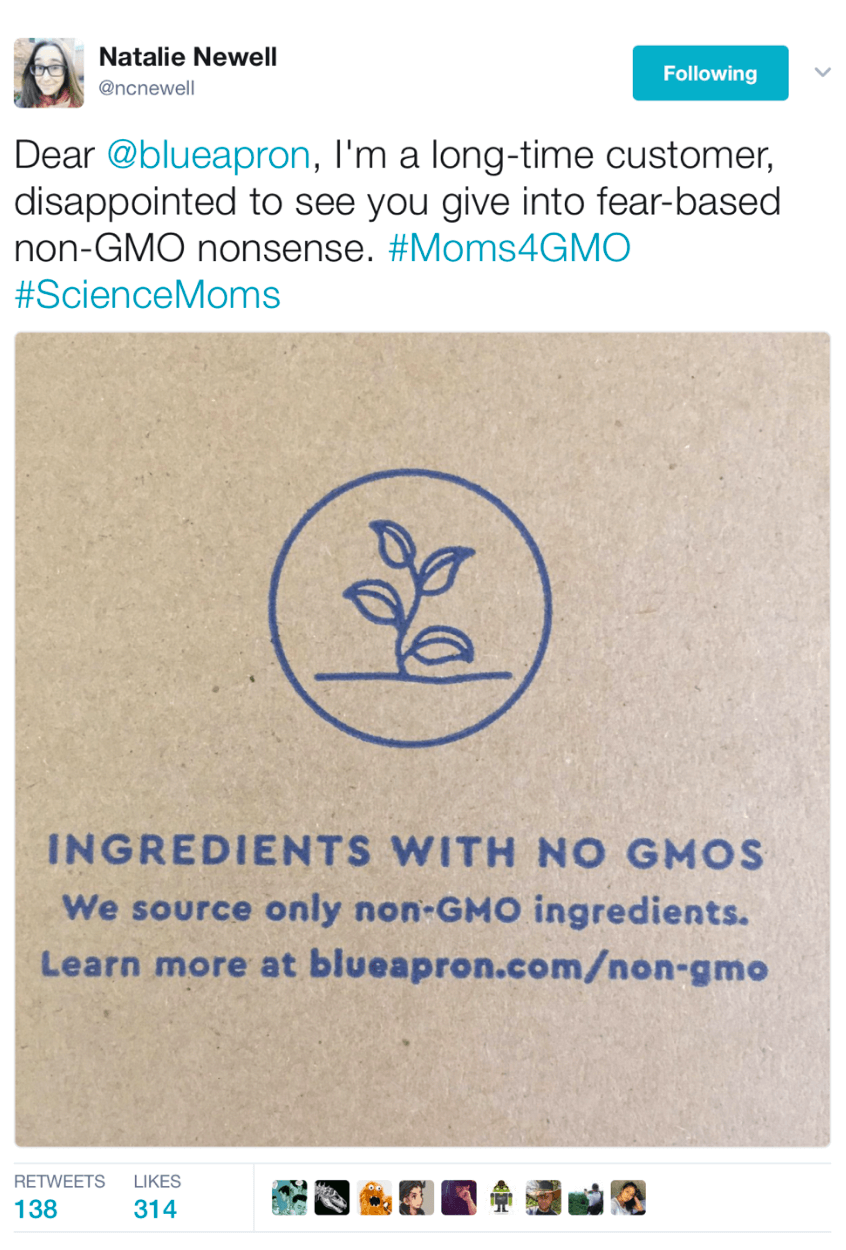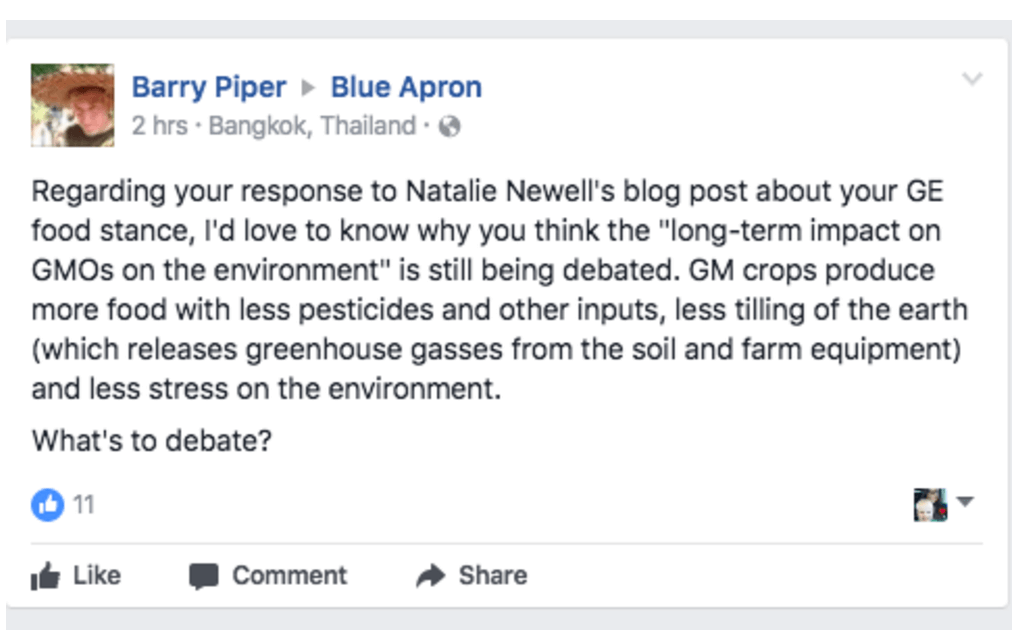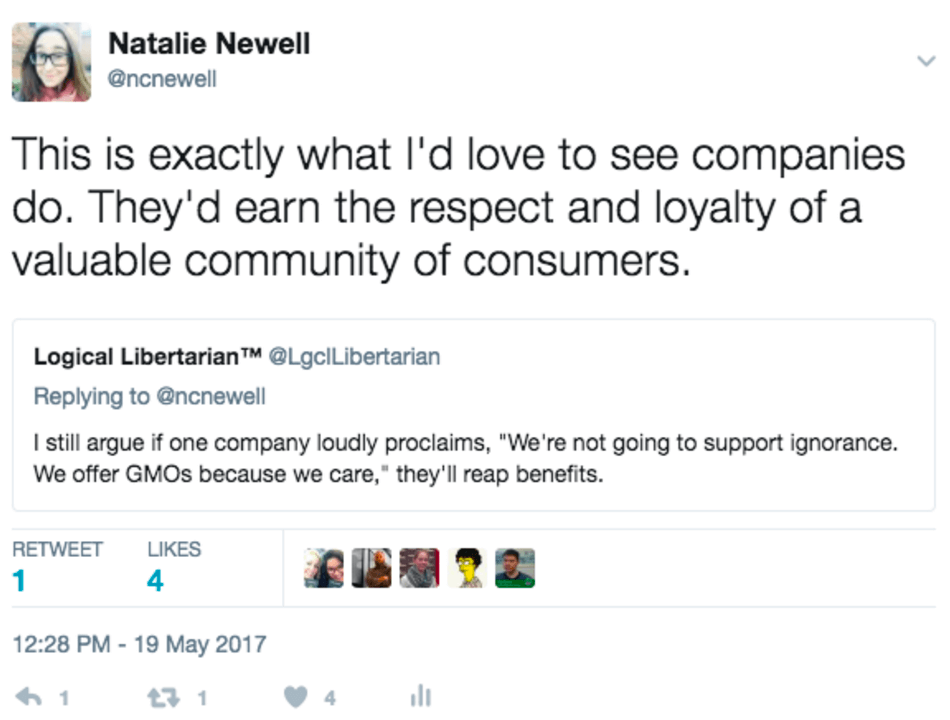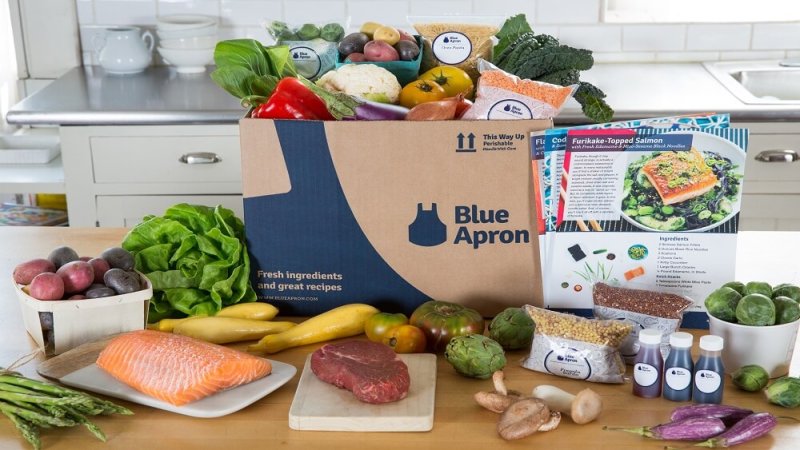Over the past year and a half, while working on my Science Moms documentary and producing and co-hosting The Science Enthusiast Podcast, I’ve found myself becoming increasingly vocal in advocating for science, reason, and critical thinking. My film, in particular, focuses largely on the fear-based misinformation surrounding GMOs and biotechnology.
Recently, while unpacking my order from Blue Apron, a meal-delivery service that I’ve used for over two years, I noticed an image on their packaging which I somehow missed in prior weeks. It was a drawing of a fairly nondescript plant, with the words “ingredients with no GMOs” printed beneath.
Disappointed in this discovery, I took to Twitter, Facebook, and, later, to my Science Moms blog, to discuss my thoughts on Blue Apron’s “no GMOs” decision.
I wrote a letter to Blue Apron, not only from my point of view as a long-time customer, but also from the point of view as a customer who supports science:
We’ve been together a long time, but I think it’s time to call it quits. I believe it’s customary in a break-up to say something like, “it’s not you, it’s me,” but that’s not the case here. It is you, Blue Apron.
I know that sounds harsh, so let me soften the blow just a touch. You’ve got a ton of positive qualities, like the fact that you’ve helped my kids try foods that they might’ve never tried, and the fact that over the past two years we’ve been together, I’ve wasted so much less food than I used to (no more rotting cilantro in the fridge, because you always send just the right amount of ingredients!). I’ve cooked approximately 300 of your recipes, and probably found at least 290 of them to be delicious. The few times that something’s been amiss with the products you’ve sent, your customer service representatives have been absolutely lovely.
Reading that, you might ask, “why the hell are you breaking up with me?”
Science. I’m breaking up with you because of science. Because even though you’ve taught me how to make fantastic calzones, enchiladas, and burgers, you clearly haven’t learned much about the safety of GMOs or educated yourself about how biotechnology isn’t something to be feared. I admit that I hadn’t paid much attention to your GMO-stance, so maybe you’ve been sharing the anti-GMO message for a while. When I noticed the “ingredients with no GMOs” image on your packaging the other day, my heart sank for a moment. I’ve been so pleased with your service, but this is something I can’t overlook. I’ve grown accustomed to your exceptional responsiveness, so I took to Twitter with my concern.

I imagine that you received some notifications over the past few days, since this tweet has been liked and retweeted hundreds of times. However, your response has been… *crickets*
I know it might be different and maybe even slightly confusing to see myself and my friends telling you to stand with science rather than the fear-based GMO rhetoric. You want to provide products that your customers want, but the general public has been misinformed about biotechnology.
So, here’s my suggestion – be bold, and dare to do something different. Talk to scientists and farmers. Talk to customers who haven’t bought into the anti-GMO narrative. Be the company who says, “we educated ourselves about GMOs, and we’re going to pass that knowledge along to our customers.” Be the company that says, “we’re going to stand with science and evidence.” Do that, and you and I will get back together (and I bet some of my friends will be signing up, too).
Until then, so long, and thanks for all the recipes.
Natalie
* * *
This open letter to Blue Apron was viewed over 30,000 times on the Science Moms blog, and was shared widely on Facebook, including to Blue Apron’s Facebook page. A representative from Blue Apron’s Customer Experience Team contacted me by email.
* * *
Hi Natalie,
I’m getting in touch because we read your tweets and blog post and wanted to provide you with context on our decision to source non-GMO ingredients. First, please know that we do recognize the complexity of the GMO issue, and entirely respect your position on it.
Our decision to source non-GMO ingredients is about our commitment to customers to be transparent about what’s in the ingredients we are delivering to them.
We strongly believe that all consumers have the right to know what is in the foods they select for themselves and their families. Since the long-term impact of GMOs on the environment is still being debated, we have elected to source and label non-GMO ingredients. Our team is actively monitoring the research that’s being published about the use of biotechnology across the food system, and listening to concerns from advocates on both sides of the debate, such as yourself.
We’d be disappointed to see you go as a Blue Apron customer, but appreciate you sharing your feedback with us.
Best,
Hanna A.
* * *
Upon reading this response, I felt a bit “meh.” (I felt even less thrilled when I found out that a similar response was sent to a number of other people who addressed similar concerns with the company.) Here is some of the reaction Blue Ribbon’s ‘defense’ stirred in Twitter:



I know the folks at Blue Apron are doing their best PR thing in order to hopefully get me out of their hair, but I think there’s a bigger discussion to be had here, regarding who companies are deciding to market their products to, and that often these marketing choices are based on misinformation.
So, of course, I responded by email to Blue Apron:
* * *
Hi Hanna,
Thank you for taking the time to respond to me, and for providing some insight into your decision regarding GMOs.
It seems that this idea of the right to know what’s in our food is something that companies understandably take seriously, but the idea of labeling “GMOs” is a bit misinformed. Labeling “GMO” or “non-GMO” doesn’t really tell a consumer what is in their food; rather, it’s a label for the way an ingredient is bred. Labeling a breeding process tells us nothing about what’s in our food. (I find this article pretty helpful.)
You mentioned that you’re monitoring some research, and I’d love it if you could point me in the direction of that research. This is of particular interest to me, as I’m currently completing my Science Moms documentary, which pays particular attention to demystifying some of the concerns about biotechnology. The film was actually inspired by a group of scientists and science communicators who wrote a letter addressing some GMO concerns.
Like you, I also find it important to inform my decisions with evidence, and I feel fortunate to be connected to a number of experts in the fields of agriculture and science. I would be happy to put you in touch with individuals from these fields, in the event that you’d like to continue this conversation and further investigate your position.
Again, I know that you want to best respond to customer concerns, and market your products in a way which meets those concerns. I just wonder if perhaps right now you have the opportunity to move a bit more towards what the science actually says about this issue.
I know that I speak for myself and many others when I say you’d have lots of support if you decide to stand with science.
All the best,
Natalie
* * *
If I ask you to think for a moment about what companies are vocally pro-GMO, I bet you’ll say “Soylent! Simplot! Arctic Apples!” And then you’ll stop, think, and have a tough time thinking of more to add to the list. This is why I believe that this conversation with Blue Apron could be something important. It’s a chance for a company to take a moment to reflect and listen to another pool of consumers—the consumers who would love to see a company adjust their views according to evidence.
If Blue Apron could begin by looking at the response that their “non-GMO commitment” has received on social media over the past week, perhaps they could reflect further on this commitment. When my blog post was shared by journalist and science communicator, Yvette d’Entremont (also known as SciBabe), commenters expressed disappointment at Blue Apron’s decision. One commenter stated: “Of course, the biggest problem with labeling is that it suggests that there is something wrong with gmo food. It only serves to perpetuate and reinforce a myth.”
Blue Apron’s original response to me included the claim that the long-term environmental impact of GMOs is still being debated. We know that GMOs do not pose a threat to human and animal health. Additionally, we know about the impact of GM crops on the environment. In fact, environmental impact studies make up a large portion of the extensive research done on GMOs, and research has found that there is little to no evidence that GM crops have a negative impact on the environment.
Blue Apron responded to my second email with a request to speak to me by phone, and I engaged in a conversation with two of their representatives. I’m pleased to note that the employees of Blue Apron grasped the fact that genetic modification is a safe (and often misunderstood) technology. I learned that Blue Apron keeps an agronomist on staff and that the company’s mission involves working closely with farmers. The representatives listened to my point of view, noting that we might need to “agree to disagree,” but seemed to at least agree that biotechnology can help bring about positive change in terms of issues of global hunger. Will they publicly acknowledge that, and advocate for biotechnology? I’m unsure.
I left the conversation feeling that Blue Apron appreciates feedback from consumers like me, who approach food issues from an evidence-based viewpoint. I don’t know that we’ll see their “ingredients with no GMOs” packaging changing anytime soon, unless perhaps they continue to receive feedback from science-minded consumers.
Natalie Newell is the director and producer of the forthcoming Science Moms documentary film, as well as one of the hosts of The Science Enthusiast Podcast. Natalie holds an MEd., and worked for a decade in the field of Montessori education before choosing to become a stay-at-home parent, and pursue her interests in science communication and secular activism. Follow her on Twitter @ncnewell































